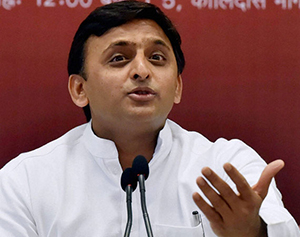Lucknow, Oct 21: The chasm in UP's ruling Samajwadi Party grew wider today with Chief Minister Akhilesh Yadav skipping an important meeting called by state party chief Shivpal Yadav to strategise for the assembly polls due early next year where the latter declared him the party's chief ministerial face.
Akhilesh, however, met the delegates, who earlier attended the meeting called by Shivpal, at his residence separately.
Shivpal had convened a meeting of SP district and city units presidents at the party headquarters earlier in the day but Akhilesh was conspicuous by his absence.
At the strategy session for the assembly polls due early next year, Shivpal, apparently seeking to bury the hatchet, declared nephew Akhilesh the party's chief ministerial face.
"Akhilesh Yadav will be the next CM, if party is voted to power. He will be our CM candidate," Shivpal said, days after Mulayam virtually left the field open by saying the newly elected legislators will choose their leader, something which did not go down well with the camp followers of the incumbent CM.
Though Shivpal, the younger brother of SP supremo Mulayam Singh Yadav, had met Akhilesh personally last night to invite him to the meeting, the Chief Minister kept away, indicating all was not well in the party despite repeated protestations by its senior leaders to the contrary.
After the meeting was over, a cryptic message went out from 5-Kalidas Marg residence of the Chief Minister that Akhilesh wanted to meet the district party presidents at a short notice.
At the brief meeting, Akhilesh apprised them of his 'rath yatra' scheduled from November 3 and said that they would be kept informed about it.
He asked them to work hard in their respective areas to reap a bumber electoral harvest and "everything will be fine".
The meeting of SP district heads was held a day ahead of the party' state executive meet. Mulayam has also convened a meeting of party legislators and ministers on October 24 to "gauge the mood" of partymen and people of their area.
Shivpal asked the district party chiefs to gear up for elections and also to make the party's silver jubilee celebrations on November 5 in the state capital a big success.
Akhilesh, with whom Shivpal is engaged in a running feud over the last few months, has already made it clear in a letter to the Samajwadi Party boss and his father Mulayam that he would be proceeding on his 'rath yatra' on November 3 to highlight the development work done by his government, in a clear indication that he would skip the November 5 event too.
With the tense stand-off between Akhilesh and Shivpal continuing, speculation about a possible split is rife with some even suggesting that a new party named National Samajwadi Party or Pragatisheel Samajwadi party with motorcycle as its symbol could be formed by the Chief Minister ahead of the assembly elections.





Comments
Great delivery. Outstanding arguments. Keep up the
amazing effort.
Look at my web site ... skip hire (http://shirleyoaq93.onesmablog.com/What-sort-of-skip-should-you-hire--2… http://shirleyoaq93.onesmablog.com/What-sort-of-skip-should-you-hire--2…)
Add new comment